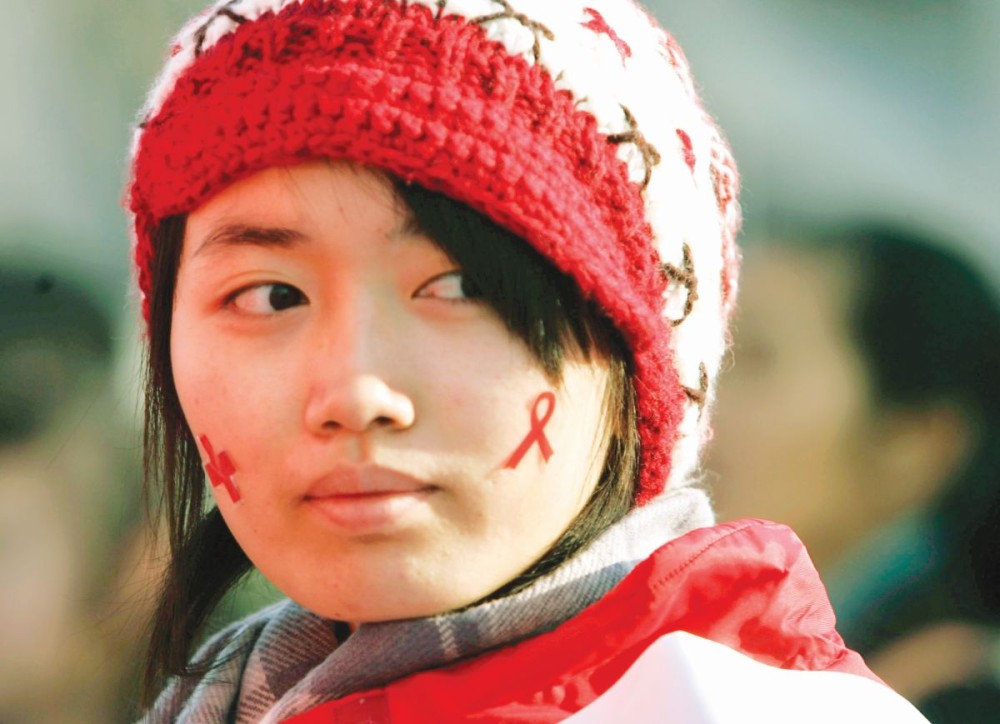A volunteer wears a sticker, a red ribbon, the symbol of AIDS awareness, as Health authorities and the U.N. AIDS agency launched a campaign to fight discrimination against people with AIDS in China, at the iconic Bird’s Nest national stadium grounds in Beijing, China, Sunday, November 30. After years of denying that AIDS was a problem, Chinese leaders have shifted gears dramatically in recent years, confronting the disease more openly and promising anonymous testing, free treatment for the poor and a ban on discrimination against people with the virus. (AP Photo)

Y Merina Chishi
Dimapur| November 30
There are stories that emerge from a place where AIDS is still considered “dirty” and associated with “morality;” and the brutal reality is that women are usually the ones who are associated with the latter.
Thongpa’s husband died of AIDS in 2003 and today, she is heading for a similar fate. With full-blown AIDS, thirty-year-old Thongpa has come to accept that her life will end similarly. To top her anguish, her sisters-in-law think she is “dirty” and treat her as an outcast in the family. Her plate and cup are kept separately and she has little access with the outside world. To escape constant sarcasm from her sisters-in-law, she works in the field whenever her health permits. The nearest place she can get her regular anti- retroviral treatment (ART) is three-hours walk from her village. Thong says she is ready to die.
Dina is also HIV positive. After her husband’s death, her mother-in-law refused to look after her and a huge misunderstanding grew between them. She eventually left the house and three children behind, and went to work for a non-governmental organization that works with people living with HIV/AIDS (PLHA). She has seen people give her disgusting stares and even been called “dirty woman.”
The common thread between these two women’s lives is the route of transmission. Tracing back to the history of the route of transmission, these women’s husbands were intravenous drug users (IDU); but it is common for people to ignore this fact. Over the years that HIV/AIDS has dominated the psyche of Naga people, women’s role in containing the virus has often been the target and more so, when the issue of “morality” emerges, women are often seen as the carrier of the virus.
AIDS through IDU has reduced considerably over the years; the sexual route of transmission has increased. Not surprisingly women and the myth of morality have only increased.
It is not that people are not sensitized enough, an HIV/AIDS counsellor says, but the truth is the same people knowingly tend to brand the fairer sex as “immoral.” She pointed out many women contract the virus on first sexual contact but they still live with the stigma that people might think she is “immoral.” The counsellor said it is hard for the women to come out of that mindset due to pre conceived notion associated with AIDS and “morality.” It is felt there is gender discrimination even in regard to the issue and there is need to go deeper, the counsellor says. For commercial sex workers (CSW), often regarded as the vulnerable population, there is little or no thought given about their customers i.e. the men. “The word CSW itself is discrimination,” an NGO worker based in Delhi said and wondered why people tend to stigmatize CSW’s while nobody questions the people who visit them. She said “men would often be the carriers of the virus because after they visit CSW’s, they go back and sleep with their wives.” A doctor working in the field of AIDS said, these days CSW’s are aware about the use of protection but often fail to protect themselves due to force and ignorance of their customers. “We have to look at it both ways. Infidelity is happening, but it is wrong for anyone to relate AIDS to morality; let alone brand women,” he said.
Although stigma and discrimination has reduced considerably over the years, there are places where character assassination has caused many women to live a secluded and stigmatized life. The church is seen as a force which can remove the taboo of relating AIDS to morality. But even here, a PLHA said “It is all about how a girl should behave, what girls should do and what girls should not do.” Unless we disassociate AIDS with morality, the next generation will perish, a social activist pointed out. She holds the view that men should also take equal responsibility for the spread of virus instead of throwing the blame on “immoral women.”
(The women mentioned in this feature are based on real life oral testimonies conducted by this Reporter for Panos South Asia, New Delhi.)






